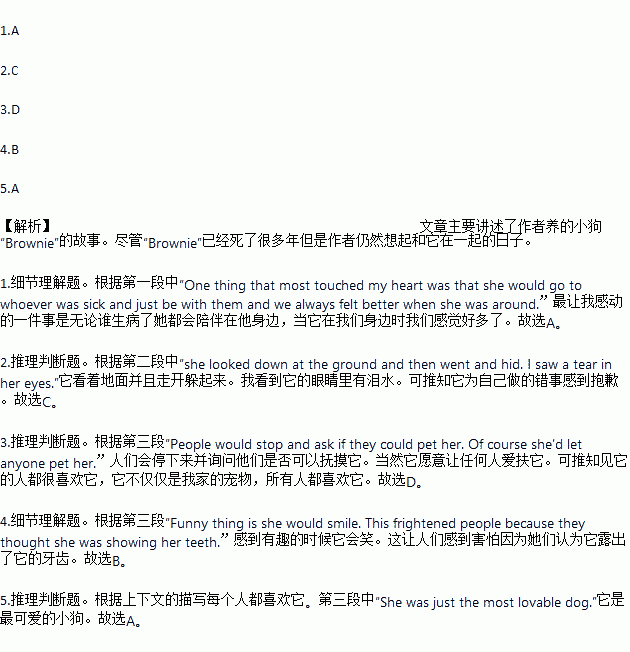题目内容
When I was six, Dad brought home a dog one day, who was called “Brownie” My brothers and I all loved Brownie and did different things with her. One of us would walk her, another would feed her, then there were baths, playing catch and many other games, Brownie in return, loved each and every one of us. One thing that most touched my heart was that she would go to whoever was sick and just be with them and we always felt better when she was around.
One day, as I was getting her food, she chewed up (咬破) one of Dad’s shoes, which had to be thrown away in the end. I knew Dad would be mad and I had to let her know what she did was wrong. When I looked at her and said, “Bad girl,” she looked down at the ground and then went and hid. I saw a tear in her eyes.
Brownie turned out to be more than just our family pet, she went everywhere with us. People would stop and ask if they could pet her. Of course she’d let anyone pet her. She was just the most lovable dog. There were many times when we’d be out walking and a small child would come over and pull up her hair, she never barked (吠) or tried to get away. Funny thing is she would smile. This frightened people because they thought she was showing her teeth. Far from the truth, she loved everyone.
Now many years have passed since Brownie died of old age. I still miss days when she was with us.
1.What would Brownie do when someone was ill in the family?
A. Keep them company B. Touch them gently.
C. Play games with them. D. Look at them sadly.
2.We can infer from Paragraph 2 that Brownie .
A. world eat anything when hungry B. loved playing hide-and-seek
C. felt sorry for her mistake D. disliked the author’s dad
3.Why does the author say that Brownie was more than just a family pet?
A. She was treated as a member of the family.
B. She played games with anyone she liked.
C. She went everywhere with the family.
D. She was loved by everybody she met.
4.Some people got frightened by Brownie when she .
A. barked B. smiled
C. rushed to them D. tried to be funny
5.Which of the following best describes Brownie?
A. Caring B. Polite
C. Brave D. Shy


 now.
now.